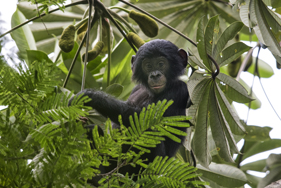Our community-led ecotourism & bonobo conservation in the Mai Ndombe region of DRC won 2017 top100 sustainable destination award

photo: Karine Aigner
Visit our research site for a unique experience with wild bonobos, organised by the Congolese NGO MbouMonTour (MMT) and the World Wide Fund for Nature (WWF)
Why see the bonobos?
Bonobos, along with common chimpanzees, are our closest living relatives and share with us over 98% of the same genetic blueprint. They are only found in the Democratic Republic of Congo south of the famed Congo River and are classified on the International Union for Conservation of Nature (IUCN) Red List as Endangered. They are known for their peaceful nature and unique display of greetings!
The area and the site
The site (Malebo) is located in the south west of the Democratic Republic of Congo, in the province of Mai Ndombe and the territory of Bolobo, less than 400 km away from the capital, Kinshasa. The bonobos live in the community forests of the villages of Nkala and Mpelu. The site is located in a unique habitat made up of a forest-savannah mosaic, providing a fantastic place to view these gentle animals in the wild. In the local tradition it is taboo to eat the bonobos as it is believed they are distant ancestors, however, they are still threatened by frequent destruction of their natural habitat and emerging diseases which can be transmitted by humans living or working in their proximity. The WWF PICBOU project (Projet Intégré de conservation des bonobos de l’ouest), in collaboration with local NGO MMT, started working with the bonobos in the area in 2006. Since then they have been habituating 3 groups of bonobos in the area in an effort to learn more about their behaviours which will aid in elaborating effective conservation strategies and developing ecotourism to bring revenue to local communities.
Getting there
The easiest way to get to the site is by direct flight from Kinshasa Ndolo airport which takes approximately an hour, during which beautiful views of the Congo River, the unique forest-savannah mosaic habitat and local villages can be observed. Alternatively to enjoy the beauty of the Congo river you can travel by boat (14 seats with a toilet on board).
Accommodation

photo: Sinziana-Maria Demian
There are 5 bungalows with ensuite bathrooms and a family house at the WWF base, where you can also take a splash in the Bamboo River which runs through camp. There are also rooms available at the MMT farm, near the village of Nkala for a more authentic experience.
Food
Our local cooks will prepare dishes with fresh produce from the area such as plantain, village-farmed goats/chicken/cows, fish from the nearby river, succulent pineapples and other seasonal fruits, plus other treats can be brought in from Kinshasa, depending on your culinary preferences.
Bonobo visit

photo: Karine Aigner
Before entering the bonobo’s forest home, you will first be privileged with a visit to the local chiefs in order to get their consent to enter into their forests. Because the bonobos are early risers, you will get up at the crack of dawn to join the local trackers on their journey into the forest. The trackers work each day to follow the bonobos and make notes on their behaviours, ranging patterns and overall health. Depending on the distance from the entrance of the forest to where the bonobos made their nests the night before, you will hike in the dense tropical forest to reach the site to see them waking up and starting to feed and play. You can then spend between 1-2 hours observing the bonobos and taking photos and videos. You will be part of a small exclusive group of approximately 4 visitors, plus the guides, to enhance this unique experience.
Things to do
In addition to seeing the bonobos, there are many other activities to do in the area, such as:
• Visit the local traditional villages, hear local tales and learn traditional skills, such as how to weave a mat or basket, local fishing methods and traditional cooking including pounding cassava
• See other animals in the area, such as monkeys and birds, or do a night walk and if you are lucky, spot nocturnal animals (including bats, civets, crocodiles and even elephants and buffalos)
• Walk a botanical trail and learn about the traditional uses of different local plants, such as those used for medicine, construction, food, etc.
• Watch and get involved in dancing with locals in a traditional ceremony
• Fishing trip on the Congo River
• Explore the area by bicycle or motorbike
• We can put together a personal package to suit your interests and budget, depending on the number of people, number of days and your accommodation and travel preferences.
Where does your money go?
WWF and MMT are non-profit organisations. In addition to covering the costs of your trip, you are contributing to a community fund for local development and the protection of bonobos. The revenue from the bonobo viewing fee and a conservation fee goes directly back to the local villages, for example, by contributing towards projects building schools and small hospitals, but also sustainable agriculture and farming. This revenue increases the motivation of the community to conserve the bonobos and their habitat.
Contact
For further information and to make a booking, please contact us at [email protected] and [email protected]
The project was selected as one of the 2017 top100 sustainable destinations.

 United Kingdom
United Kingdom United States
United States Asia Pacific
Asia Pacific












































Dozens fall ill in P&O Cruises ship outbreak
Turkish Airlines flight in emergency landing after pilot dies
Boy falls to death on cruise ship
Unexpected wave rocks cruise ship
Storm Lilian travel chaos as bank holiday flights cancelled